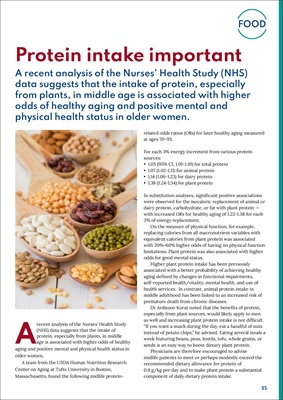
35
FOOD
Protein intake important
A recent analysis of the Nurses' Health Study (NHS)
data suggests that the intake of protein, especially
from plants, in middle age is associated with higher
odds of healthy aging and positive mental and
physical health status in older women.
A
recent analysis of the Nurses' Health Study
(NHS) data suggests that the intake of
protein, especially from plants, in middle
age is associated with higher odds of healthy
aging and positive mental and physical health status in
older women.
A team from the USDA Human Nutrition Research
Center on Aging at Tufts University in Boston,
Massachusetts, found the following midlife proteinrelated
odds ratios (ORs) for later healthy aging measured
at ages 70-93.
For each 3% energy increment from various protein
sources:
• 1.05 (95% CI, 1.01-1.10) for total protein
• 1.07 (1.02-1.11) for animal protein
• 1.14 (1.06-1.23) for dairy protein
• 1.38 (1.24-1.54) for plant protein
In substitution analyses, significant positive associations
were observed for the isocaloric replacement of animal or
dairy protein, carbohydrate, or fat with plant protein -
with increased ORs for healthy aging of 1.22-1.58 for each
3% of energy replacement.
On the measure of physical function, for example,
replacing calories from all macronutrient variables with
equivalent calories from plant protein was associated
with 20%-60% higher odds of having no physical function
limitations. Plant protein was also associated with higher
odds for good mental status.
Higher plant protein intake has been previously
associated with a better probability of achieving healthy
aging defined by changes in functional impairments,
self-reported health/vitality, mental health, and use of
health services. In contrast, animal protein intake in
middle adulthood has been linked to an increased risk of
premature death from chronic diseases.
Dr Ardisson Korat noted that the benefits of protein,
especially from plant sources, would likely apply to men
as well and increasing plant protein intake is not difficult.
"If you want a snack during the day, eat a handful of nuts
instead of potato chips," he advised. Eating several meals a
week featuring beans, peas, lentils, tofu, whole grains, or
seeds is an easy way to boost dietary plant protein.
Physicians are therefore encouraged to advise
midlife patients to meet or perhaps modestly exceed the
recommended dietary allowance for protein of
0.8 g/kg per day and to make plant protein a substantial
component of daily dietary protein intake.